
Escape from Overshoot
New Society Publishers (Verlag)
978-0-86571-975-0 (ISBN)
An excellent primer on key insights and questions in ecological economics from a celebrated pioneer of the field.
—Jason Hickel, author, Less is More
Earth is in overshoot. The juggernaut of economic growth rolls on, consuming the biosphere, breaking planetary boundaries, and stretching inequality and injustice to the breaking point. But does it really need to be this way? And if not, what are the options?
In Escape from Overshoot, celebrated ecological economist Peter A. Victor takes us on a grand tour of the overshoot crisis. From the history of economic thought through energy and material blindness, we learn how we got here and why collapse is inevitable unless we change course. But as the clock ticks, what pathways are possible and plausible? Victor surveys the alternatives — from green growth and doughnut economics to well-being, steady-state, and post-growth economics — and their limits. He then dives into what the latest and most sophisticated economic modelling tells us about whether we can intentionally shrink our economy and avoid collapse, all while enhancing human thriving and justice for all. The results are both surprising and profound.
Ambitious, measured, and accessible, Escape from Overshoot is a vividly illustrated guide to the past, present, and future of the human economic project and our place on planet earth.
Peter A. Victor is Professor Emeritus at York University. He was awarded a PhD in economics from the University of British Columbia in 1971 and has worked for 50 years in Canada and abroad as an academic, consultant, and public servant specializing in ecological economics and alternatives to economic growth. Peter sits on the Honorary Board of the David Suzuki Foundation and the Circle of Ecological Economics Elders, is chair of the Science Advisory Committee of the Footprint Data Foundation, and is an elected member of the Royal Society of Canada. He was the recipient of the Molson Prize in the Social Sciences from the Canada Council for the Arts in 2011 and the Boulding Memorial Prize from the International Society for Ecological Economics in 2014. He is the author of six previous books, including Managing without Growth. He lives in Toronto, Ontario.
Acknowledgments
Foreword
Prologue: A Planet in Peril
Chapter 1. Overshoot — A Look at the Evidence
Overshoot
The Economy as a Sub-System of the Planet
Material Flows
Forests
Agriculture
The Great Acceleration
Biodiversity
Chapter 2. How to Think About the Future
Chapter 3. Voices from the Past — Economic Growth and its Critics
From Progress to Economic Growth
Classical Economics and Economic Growth
Neoclassical Economics Takes Center Stage
Critics of Economic Growth
Environmental Economics
Ecological Economics
Conclusion
Chapter 4. The Economic System — How Does it Work?
The Neoclassical Capitalist Economy
The Keynesian and Post-Keynesian Capitalist Economy
The Marxian and Post-Marxian Capitalist Economy
Conclusion
Chapter 5. Current Trends to an Uncertain Future
Economic Trends
Demographic Trends
Income Inequality Trends
Investment Trends
Consumption Trends
Technology Trends
Work Trends
Energy Trends
Conclusion
Chapter 6. Green Growth — A Dangerous Distraction?
Defining Green Growth
Growth of Many Colors
Does Increased Efficiency Lead to Decoupling?
Future Prospects for Green Growth
Stocks not Flows: The Achilles Heel of Green Growth
Green Investment
Barriers to Green Growth
Conclusion
Chapter 7. Post Growth Possibilities
Steady-State Economy
Circular Economy
Wellbeing Economy
Buen Vivir
Doughnut Economics
Regenerative Economy
Degrowth
Ecosocialism
Conclusion
Chapter 8. Modeling an Escape from Overshoot
The Story So Far
From Local to Global Overshoot
Contraction and Convergence
Reprising the Limits to Growth
The Plausibility and Possibility of a Planned Contraction of a High-Income Economy
Chapter 9. Planning an Escape from Overshoot
Fourteen Propositions for Planning an Escape from Overshoot
Living the Escape from Overshoot
Reforms on the Path to Escape
Conclusion
Notes
Index
About the Author
About New Society Publishers
| Erscheinungsdatum | 22.03.2023 |
|---|---|
| Zusatzinfo | 150 Halftones, black and white |
| Verlagsort | Gabriola Island |
| Sprache | englisch |
| Maße | 191 x 225 mm |
| Gewicht | 426 g |
| Themenwelt | Naturwissenschaften ► Biologie ► Ökologie / Naturschutz |
| Wirtschaft ► Volkswirtschaftslehre ► Wirtschaftspolitik | |
| ISBN-10 | 0-86571-975-6 / 0865719756 |
| ISBN-13 | 978-0-86571-975-0 / 9780865719750 |
| Zustand | Neuware |
| Informationen gemäß Produktsicherheitsverordnung (GPSR) | |
| Haben Sie eine Frage zum Produkt? |
aus dem Bereich


